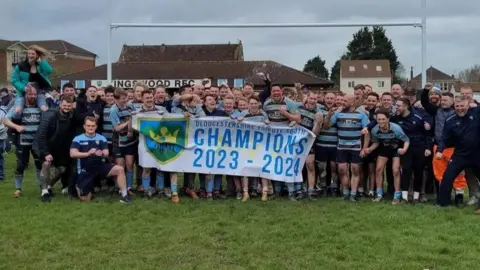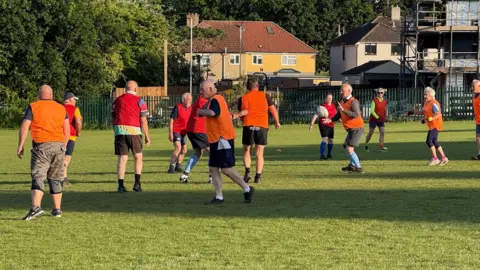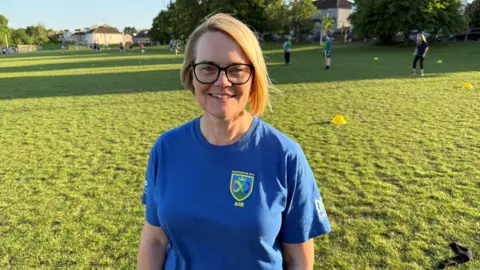How investing in the community saved a rugby club
 Kingswood RFC
Kingswood RFCA rugby club says more than a decade of investment in its community is the reason it is expanding at a time when some are struggling.
Before the Covid-19 pandemic, Kingswood RFC near Bristol struggled to field a team and its future looked bleak.
But fast-forward five years and the club has three men's teams, a women's team, walking rugby and an inclusive team aimed at getting people with disabilities playing the game.
"It's more than a decade of hard work to promote youth rugby and when the kids grow up and come through, they have somewhere to go - and now they can stay at Kingswood," said club chair, Ian Starr.
Observing the decline of the club's senior teams, club officials decided in the mid-2010s that making rugby as accessible as possible to younger players was the best way to protect its long-term future.
The club prioritised ensuring there was always an age-group for players at every stage of their development, and opened the club to more community events. This, they say, made it more likely younger players would go on to play senior rugby.
Officials also decided to keep the club's annual membership fees low in an attempt to avoid excluding families on lower incomes.
In short, Kingswood RFC would be seen as a local community hub.
It was a big effort for the club's volunteer coaches, but eventually the younger players started graduating to senior teams.
"It's probably fair to say most players left us when they went through the youth teams," said Ian Starr.
"But now, we've got one of the youngest teams in the league - average age of maybe 24 or 25 - and the number of homegrown players in the [men's] first team is brilliant."
The club now has more than 700 paying members across senior, youth and specialist teams.

The club said the idea that as many people as possible should be able to access rugby was fundamental to making the club thrive.
A Wednesday evening walking rugby club was started to encourage older players, with a focus on social events and fitness.
The club now hosts what they believe is the world's biggest festival of walking rugby each July, with teams travelling from around the country to play at Kingswood.
An all-inclusive rugby (AIR) team was also established to give people with disabilities more opportunities to play.
The AIR team was founded by the parents of local children who wanted to play rugby, but who struggled with the physical nature of the game.
They approached the club about setting up a new team and were welcomed in.
Two years on, the club has dozens of members turning up to play every week.
Coach and co-founder, Louise Sims, told the BBC: "I feel really proud to be a part of it.
"Inclusive sport is hard to access and the number of players we have just proves there needs to be more of it out there."
She added: "It also gives coaches in other age groups somewhere where they can direct some of their players who they suspect may have a hidden disability, so it's really good for the club as a whole."
AIR team member, Owen, told BBC West: "My favourite part about playing rugby is seeing my friends and having fun together.
"It makes me feel positive and active - running a lot, scoring a lot of tries and enjoying myself."

While Kingswood RFC is not alone in seeing a rise in the number of players, the club said the speed of the rise has been dramatic.
The Rugby Football Union (RFU), the sport's governing body in England, told the BBC participation in rugby union is now 5% higher than the pre-Covid 2018-19 season and 7% higher than the 2023-24 season.
This includes the adult men's game, for which there have been concerns over player numbers for years.
Despite this increase across the board, Kingswood officials say it is still fairly common for an opposing team to be unable to field enough players and have to postpone or cancel a match as a result.
Earlier this year, some clubs expressed concerns about the support they receive from the RFU and questioned how the organisation is run.
A spokesperson for the RFU responded: "While the majority of club's are self-sustaining, the RFU funds insurance for all clubs and other things including coaching and match official qualifications, player welfare, competition management, programmes within schools rugby, off-field club support such as legal and licensing support, floodlight funding and over 145 full-time rugby development staff up and down the country."
Follow BBC Bristol on Facebook, X and Instagram. Send your story ideas to us on email or via WhatsApp on 0800 313 4630.
